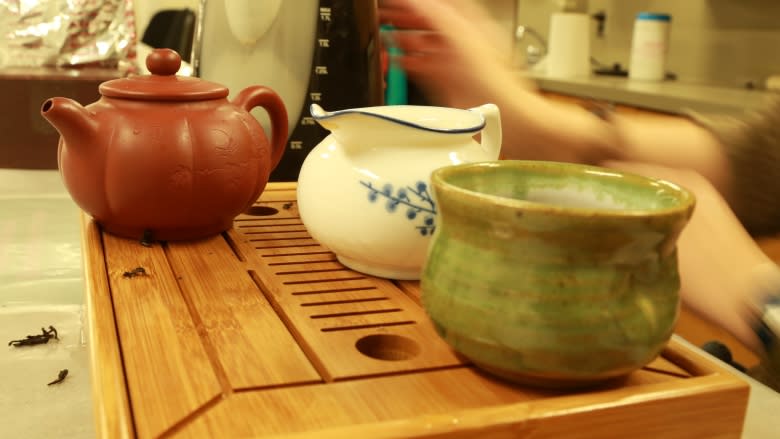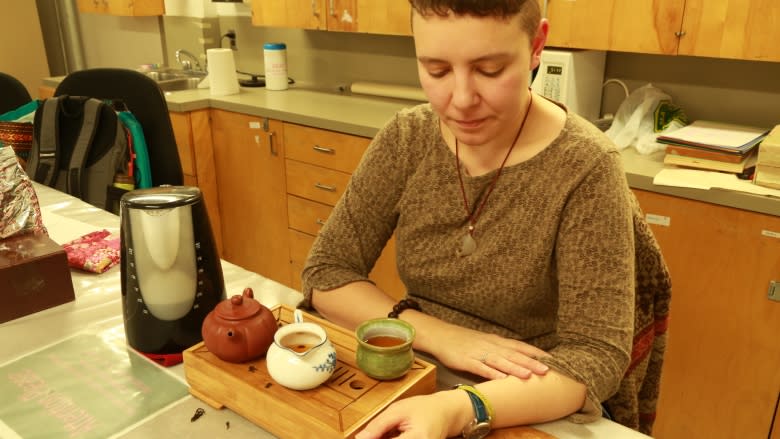Master of tea: An ancient Chinese tradition savoured in Fredericton
When Alevtina Sharapova pours tea, the room goes quiet.
She fills a small, clay pot with water to heat it, before pouring it out and filling it anew, now with the fragrant leaves she's brought all the way from China.
The sound of the gurgling water, of her pouring the tea into tiny, flat cups, immediately holds people's attention and stops their chatter.
That's part of the ceremony, she says.
"I think it's a very good space to share something, to make new friends, and to just relax," she says.
After 10 years of living in Beijing, the native of Russia has brought the ancient Chinese art of preparing tea to Fredericton.
Sharapova holds frequent tea ceremonies at the New Brunswick College of Craft and Design and has been invited to show her skills at local restaurants and private events.
She's loved tea for a long time, she says.
Started in Russia
She discovered the fragrant drink when the first Chinese tea houses opened in Moscow in the late 1990s.
Until then, she only knew tea the way Russians drank it at home — with lemon, sugar or jam.
Chinese tea is best enjoyed pure, she says.
"After several times you become more sensitive to the smells, to the tastes," she says.
But it was the tea houses and their atmosphere that fascinated her most.
People had to take off their shoes, turn off their mobile phones, keep conversations down.
"It was so relaxing, we spent a lot of time there," she says.
Sharapova was so taken with the experience that she decided to quit her job at an interior design office to work in the tea houses.
She learned to prepare the hot beverage the same way the Chinese had done for thousands of years.
When her husband was offered a job in China in 2006, Sharapova was already considered a master of the craft but decided to study more about tea in the land where it all began.
"In China, the tea ceremony is maybe not as popular as before but in Taiwan it is," she says.
"After the revolution, a lot of intelligent people and cultured people, they went to Taiwan and they preserved this knowledge."
Master of tea ceremony
Sharapova says she only completed the first of six grades of becoming a "master of tea ceremony" because she could not keep up with the language. She does hold a diploma from Russia, though.
She learned all 25 steps of making tea, a process of minute details, including which hand to use when preparing and pouring the tea.
She graduated after four months, the only foreigner in the class.
"They were so surprised," she says. "My Chinese language wasn't very good at the time but I knew all the names of the teas."
She continued to study tea and how it's made for the next 10 years, visiting most regions in China that produce it.
Sharapova says there are at least five main types of tea in the country — green, yellow, black, red and white — all grown and prepared for sale in different ways.
White tea, she says, can be poured almost immediately once the leaves dry after they're picked, while black tea ferments for three months.
"It smells like earth or fallen leaves from the forest," she says.
Calms you down
Sharapova says tea is not an ordinary product and it can affect people in different ways.
Sometimes, when she needs to focus on her work, she drinks oolong. When she needs to relax, she has a cup of green.
And black tea is more active, she says, "so you can drink it in the morning like coffee."
Those who attend her ceremony learn they don't need to buy a fancy tea set, as long as they have clean water and a quality product.
But most important, drinking tea should not feel hurried, Sharapova says.
For a while, she worked as a graphic designer in a busy advertising firm. The deadlines were constant and the stress levels high. She grew tired of the rush and found that tea helped.
She brought her tea set to work and whenever someone approached her with yet another project, she would say: "OK, please sit, drink a cup of tea. Do you have five minutes? Nobody will die."
Sharapova hopes her tea ceremony will catch on in Fredericton.
She often sees people walking around or working with a cup of coffee in hand, but suggests it's time they try something new in their downtime.
"Because when I'm drinking tea, I have to sit, because it's my time, my time to relax, to think of something."




